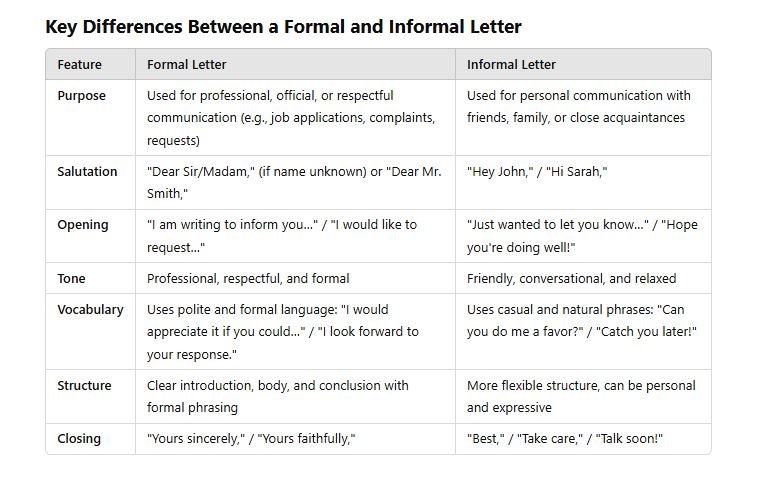How to Write an Informal IELTS Letter: A Comprehensive Guide
Introduction
Richard | Love to Learn English
In the IELTS General Training Writing Task 1, you may be required to write an informal letter. This guide will help you structure your response, use natural and conversational language, and improve your grammar and vocabulary to achieve a high band score.
By the end of this guide, you will:
Learn how to identify an informal letter.
Understand how to plan and structure your response.
Discover useful phrases and vocabulary.
Get a checklist to ensure your letter meets all requirements.
Receive tips to enhance your grammar and writing skills.
Identifying an Informal Letter
Before writing, determine whether the letter is formal, semi-formal, or informal. Informal letters are written to friends, family, or close acquaintances and have a more relaxed tone.
Example Situations for Informal Letters:
Writing to a friend about a recent trip
Inviting a family member to visit
Thanking a friend for a favor
Apologizing for missing a social event
Congratulating a friend on an achievement
Key Differences Between Formal and Informal Letters

Planning Your Letter
A well-structured letter is essential for clarity and coherence. Follow this format:
1. Salutation:
"Hey [Name],"
"Hi [Name],"
2. Introduction (Reason for Writing):
Start with a friendly opening. Example: "Hope you’re doing well!" or "It’s been a while since we last talked."
3. Body Paragraphs: Each paragraph should cover one of the bullet points given in the task.
Paragraph 1: Explain the situation.
Paragraph 2: Provide details relevant to the question.
Paragraph 3: End on a friendly note and request a response if needed.
4. Conclusion (Friendly Closing Statement):
Example: "Looking forward to catching up soon!"
5. Sign-off:
"Take care,"
"Cheers,"
"See you soon,"
Useful Vocabulary and Phrases
Using appropriate language enhances your score. Here are some useful phrases for different sections of an informal letter:
Opening Statements:
"Hope you're doing great!"
"It's been ages since we last caught up."
"I just wanted to drop you a quick note to say…"
Making Requests or Suggestions:
"How about we meet up next weekend?"
"Would you mind helping me with…?"
"Let me know what you think!"
Expressing Apologies:
"Sorry for not getting back to you sooner."
"I feel awful about missing your party."
"Hope you’re not too mad at me!"
Closing Statements:
"Can’t wait to hear from you!"
"Let’s catch up soon!"
"Take care and talk soon!"
IELTS Informal Letter Writing Checklist
Before submitting your letter, ask yourself the following:
Have I read and understood the instructions?
Is my letter appropriately informal?
Have I planned my response?
Did I cover all three bullet points?
Have I used natural and conversational language?
Is my letter structured in paragraphs?
Are my ideas clear and easy to understand?
Did I vary my vocabulary and avoid repetition?
Have I checked for grammar and spelling errors?
Is my letter within the 150-200 word limit?
Sample Band 9 Informal Letter
Task:
You have recently moved to a new city and want to invite your friend to visit. Write a letter to your friend. In your letter:
Describe your new home.
Explain what they can do in your city.
Suggest when they should come and visit.
Hey Sarah,
Hope you’re doing great! It’s been way too long since we last met, and I really miss spending time with you. We need to catch up properly!
I recently moved to San Diego, and I have to say, it’s absolutely incredible! My apartment is super cozy, and the best part? It has a balcony with a breathtaking view of the beach. The sunsets here are stunning—you’d love them! The weather is perfect almost every day, with a cool ocean breeze and endless sunshine.
There’s so much to do here! We could spend the mornings at the beach, check out some amazing cafés in the afternoon, and even go hiking at Torrey Pines. Plus, the food scene is incredible—there are so many taco spots that I know you’d go crazy for!
You should definitely come visit next month! The weather will be ideal, and we’ll have an amazing time exploring the city together. Let me know what you think—I’d love to plan something fun!
Can’t wait to see you!
Take care,
Emma
Conclusion
Writing an informal letter for IELTS is all about sounding natural, warm, and engaging. By following the structure outlined in this guide, using appropriate informal language, and checking your grammar, you can achieve a higher band score.
Practice writing letters to different prompts and review them using the checklist. The more you practice, the more confident you’ll become!
Happy writing!
In the IELTS General Training Writing Task 1, you may be required to write an informal letter. This guide will help you structure your response, use natural and conversational language, and improve your grammar and vocabulary to achieve a high band score.
Writing a formal letter is a crucial skill for the IELTS General Training Writing Task 1. This guide will help you structure your response, use appropriate language, and improve your grammar and vocabulary to achieve a high band score.
In Part 1 of the IELTS Writing test, you may be asked to describe a process. While process questions are less common than charts or graphs, they do appear occasionally. Fortunately, process questions are generally easier to answer, though many people overlook preparing for them. This is a missed opportunity, as it doesn’t take long to become familiar with these types of questions and learn how to respond effectively.
The Future Perfect Continuous tense describes an action that will have been happening for a certain period of time at a specific point in the future. This tense allows you to emphasize the duration of an ongoing activity up to a particular moment.
The Present Perfect Continuous tense is vital for describing actions that began in the past and are still continuing, or have recently stopped but have a present result. It’s a tense that frequently comes up in the IELTS Speaking test when you're asked about activities that you have been doing recently, changes, or habits that have been ongoing.
The Past Perfect Continuous tense is used to describe actions that were ongoing in the past before another action or time. For IELTS Speaking or Writing, mastering this tense will help you describe past experiences in a more sophisticated way, which can boost your score in the grammar and coherence categories.
In IELTS Speaking Part 2, you're given a cue card with a specific topic, and after one minute of preparation, you need to speak for up to two minutes. This part of the test assesses your ability to speak fluently and coherently. But one common concern for many candidates is: what happens if you go off-topic?
In the 2024 IELTS Speaking test, Part 3 focuses on a two-way discussion where you’ll be asked more abstract and complex questions related to the topic from Part 2. The aim is to assess your ability to discuss ideas, analyze issues, and express opinions on broader subjects. This part of the exam gives you the opportunity to showcase your critical thinking, depth of knowledge, and fluency in handling more challenging themes.
In this article, we’ll explore some of the key themes and practice topics for IELTS Speaking Part 2 in 2024. These topics will help you prepare effectively and build confidence for the exam.
Practicing these 100 Future Perfect questions for IELTS Speaking will help you build fluency and confidence when discussing future actions and plans. The future perfect tense is a powerful tool for expressing what you anticipate completing at specific points in the future, which can be useful in many IELTS Speaking contexts.
The Future Continuous tense is used to describe actions that will be happening at a specific point in the future. It’s a crucial tense to understand for the IELTS Speaking test, especially when talking about future plans or predictions. Practicing with future continuous questions will help you communicate fluently when discussing upcoming activities or events.
By regularly practicing with these questions, you will gain confidence in discussing past events and situations, which is crucial for your IELTS Speaking exam success!
These 100 questions in the present continuous tense are designed to help you practice for the IELTS Speaking test. As you go through them, focus on forming complete, grammatically correct sentences to improve fluency and accuracy. Happy practicing!
In an IELTS Discussion essay, you are required to present two opposing viewpoints on a specific topic and then provide your own opinion. This type of essay assesses your ability to discuss multiple perspectives while articulating your stance clearly.
By following this structure and approach, you'll be well-prepared to write a high-scoring Cause and Solution essay for IELTS Writing Task 2.
In this blog, we will provide a step-by-step guide for effectively addressing each of these question types. Whether you're preparing for your first attempt or looking to refine your skills, this comprehensive approach will help you navigate the complexities of IELTS Writing Task 2 with confidence.
In the IELTS Writing Task 2, crafting a well-structured opinion essay efficiently is crucial. While there's no strict word limit, staying within 250-300 words helps you manage your time effectively and enhances your overall score. Here’s a concise approach to writing an effective opinion essay.
In the 2024 IELTS Speaking test, Part 1 focuses on everyday topics and familiar themes. This section is designed to assess your ability to engage in a natural conversation, covering a wide range of common subjects. In this article, we’ll explore some of the key themes and practice questions for 2024, giving you an idea of what to expect and helping you prepare confidently for this part of the exam.
In the IELTS Writing Task 2, the problem and solution essay asks you to explain a particular issue, discuss its causes, and suggest practical solutions. The goal is to demonstrate your ability to clearly organize ideas, explain problems, and propose solutions.
One common question among test-takers is whether it is permissible to tell lies or fabricate details in their responses. Understanding how to balance honesty with effective communication can help you perform better in the test. Here’s a detailed exploration of whether you can tell lies in the IELTS Speaking test and how to navigate this aspect effectively.
Not speaking for the full two minutes in IELTS Speaking Part 2 can negatively impact your scores in fluency, coherence, and task achievement. To ensure you make the most of this time, prepare thoroughly, expand on your ideas with details and examples, and practice speaking for the full duration.
By applying the "Comfort Zone" technique, you can approach any topic with confidence and clarity, enhancing your overall performance in IELTS Speaking Part 2. Good luck with your preparation!
Using contractions effectively in the IELTS Speaking test can enhance the naturalness and fluency of your speech. While contractions help convey a conversational tone, it’s important to avoid informal and colloquial contractions in formal writing.
While filler words are a natural part of everyday conversation, their excessive use can negatively impact your IELTS Speaking score by affecting your fluency, coherence, and overall impression.
Interruptions by the IELTS examiner during the Speaking test are a normal part of the process and are designed to ensure a thorough assessment of your language abilities. By understanding the reasons behind these interruptions and preparing accordingly, you can handle them with confidence and use them to showcase your language skills effectively.
Asking questions during the IELTS Speaking test can be a valuable tool when used correctly. It helps you clarify confusing points, buy time, and engage more effectively with the examiner.
If you’re preparing for the IELTS Speaking test, you’ve probably come across the term “colloquial language” in the band descriptors. It’s one of the factors that can help boost your score, especially in the Lexical Resource category. But what exactly is colloquial language, and how can you use it effectively during the test?
By understanding and working on these four criteria, you can improve your overall band score in the IELTS Speaking test. Aim to strengthen your weaker areas while maintaining your stronger ones to maximize your performance.
Here are 100 Future Simple questions for IELTS Speaking practice. These questions are designed to help you use the Future Simple tense ("will" or "going to") and are similar to those asked in the IELTS Speaking exam, especially in Part 1 and Part 3.






























In this guide, we’ll go over everything you need to know about IELTS Writing Task 1 map questions, covering essential topics such as the types of map questions, how to structure your answers, and important vocabulary.